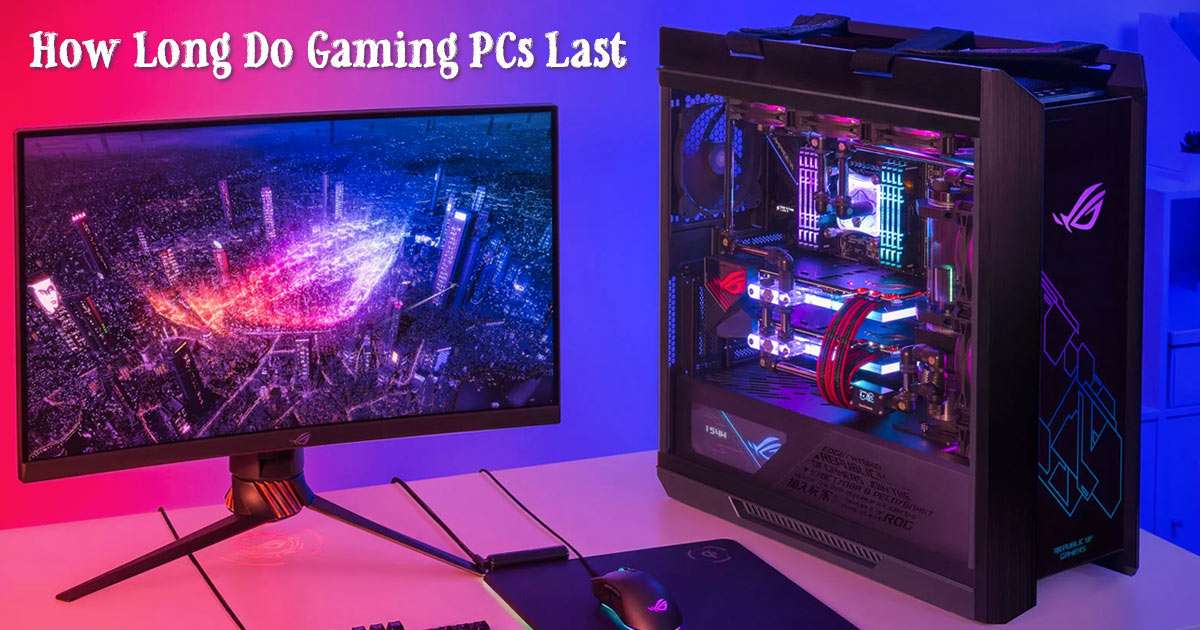How Long Do Gaming PCs Last – Understanding Their Lifespan & Worth

Gaming PCs have become the cornerstone of immersive gaming experiences, offering powerful hardware and stunning graphics that console gamers can only dream of. But one common question lingers in the minds of gamers and potential buyers: How long do gaming PCs last, and is it worth the investment? This article will explore the gaming PC lifespan and whether owning one is worth investing in.
The Lifespan of a Gaming PC
A gaming PC’s lifespan can vary significantly depending on various factors, including the components used, how well you maintain it, and the pace of technological advancements. A well-built gaming PC can survive five to eight years before displaying indications of wear and tear.
How long should a gaming PC last?
To determine how long a gaming PC should last, we must consider the evolution of hardware and software. Gaming PC components such as the CPU, GPU, RAM, and storage devices have advanced rapidly. As a result, gaming computers may become obsolete more quickly than other types of computers.
For most gamers, a gaming PC that lasts around five to six years is reasonable. During this time, your computer should be able to run recent games in respectable settings. However, you might upgrade more frequently if you’re an enthusiast demanding the best graphics and performance.
Gaming PC Lifespan Factors
Several factors influence the lifespan of a gaming PC, including:
Component Quality
The quality of the components used in your gaming PC is a critical factor that determines how long it will last. Regarding component quality, it’s not just about the brand but also the specific model and the materials used. High-quality, durable components tend to have a longer lifespan and can withstand the rigors of gaming over the years.
When selecting components, consider investing in reputable brands known for their reliability. While they may be slightly more expensive, their longevity and performance may make them an ideal choice. For instance, renowned graphics card manufacturers like NVIDIA and AMD produce GPUs that are not only powerful but also built to last.
Upgradability
A key aspect of extending the lifespan of a gaming PC is its upgradability. A gaming PC that allows for easy upgrades can adapt to evolving technology, keeping your system relevant and up-to-date for a longer period.
Modern gaming PCs often come with features that make upgrading a breeze. Easily accessible internal components, like the RAM, GPU, and storage drives, should be priorities when choosing your gaming rig. This flexibility lets you replace outdated components with newer, more powerful ones, allowing your PC to meet the latest game and software demands.
Maintenance
Regular maintenance is necessary to preserve the longevity and health of your gaming PC. Neglecting maintenance can lead to overheating and component wear, significantly reducing your system’s lifespan. Here are some maintenance tasks that can help extend the longevity of your gaming PC:
- Dust Management: Dust can collect and jam cooling fans inside your computer, lowering efficiency. Open your computer’s case regularly and carefully remove dust using compressed air or a soft brush.
- Thermal Paste Replacement: The thermal paste between your CPU and its cooler can deteriorate over time, resulting in greater temperatures. Replacing the thermal paste might help keep the system cool.
- Cable Management: Proper cable management enhances airflow and makes accessing and upgrading components easier. Neatly organized cables prevent heat buildup and allow air to flow freely through your PC.
- Software Updates: Maintain the most recent versions of your operating system and drivers. Manufacturers release updates to improve stability and compatibility, ensuring your system remains efficient.
You can dramatically extend the lifespan and performance of your gaming PC by taking a proactive approach to maintenance.
Technological Advancements
The gaming business is well-known for its rapid technical progress. New hardware and software innovations are constantly being introduced, which can quickly render older gaming PCs obsolete. As a result, the pace of technological advancements can make your gaming PC feel outdated sooner than you might expect.
Consider the following ways to reduce the impact of technology improvements on how long gaming PCs last:
- Future-Proofing: When building or purchasing a gaming PC, invest in components slightly ahead of the current technology curve. This can give your system more staying power as new games are released.
- Incremental Upgrades: Opt for incremental upgrades when necessary instead of replacing your entire system. Upgrading your GPU or adding more RAM to your PC will dramatically improve its performance and keep it competitive with the latest games.
- Software Optimization: Keep an eye on game developers’ recommendations for hardware. Some games are optimized for older systems, and altering in-game settings might help you have a more enjoyable gaming experience on older hardware.
Component quality, upgradability, maintenance, and staying mindful of technological advancements all play vital roles in determining how long your gaming PC will last. By making informed choices when selecting components, regularly maintaining your system, and adapting to the ever-changing landscape of gaming technology, you can maximize the lifespan of your gaming PC and continue to enjoy high-quality gaming experiences for years to come.
Is a gaming PC worth it?
Whether a gaming PC is worth the investment ultimately depends on your gaming preferences, budget, and expectations. Here are some key points to consider:
Gaming Experience
Gaming PCs offer a superior gaming experience with higher frame rates, better graphics, and more customization options. The investment may be beneficial if gaming is an important part of your life.
Versatility
Gaming PCs are used for more than just gaming. They can handle various tasks like video editing, content creation, and productivity applications, making them versatile machines.
Budget
Gaming PCs are available at a variety of price points. Finding a gaming PC that suits your budget and gaming needs is possible. Consider your financial situation before making a decision.
Longevity
While gaming PCs may require periodic upgrades, they last longer than gaming consoles. This longevity can provide a more cost-effective gaming solution in the long run.
Learn How Long a Gaming PC Should Last.
In summary, the lifespan of a gaming PC can vary, but on average, you can expect it to last around five to eight years. How long your gaming PC lasts depends on component quality, upgradability, maintenance, and technological advancements. Your gaming preferences and budget will play a role in whether you think a gaming PC is worth the money.
Gaming computers share similar longevity considerations, lasting approximately five to eight years. If you’re passionate about gaming and value a high-quality gaming experience, a gaming PC or computer can be a wise choice, providing years of gaming enjoyment. Make your choice wisely, invest in quality components, and keep your system well-maintained to maximize its lifespan and gaming satisfaction.

